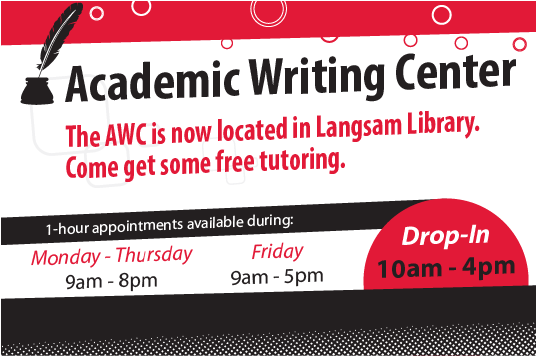Become a Better Writer with the Academic Writing Center

No matter your program, writing is a fact of graduate life. Classwork, journal and conference papers, the intimidating bulk of a thesis or dissertation: you’re constantly putting your knowledge into words. Complicated academic ideas can be hard to communicate, but you don’t have to do it alone. The tutors at the Academic Writing Center (AWC) provide free assistance to get you through even the trickiest writing tasks.
Located on the fourth floor of Langsam Library in room 401N, the AWC serves all UC students, including graduate students, international students and distance learning students. Students work with tutors to improve their writing skills, not only for specific documents but also for general communication issues. “The tutor will identify problematic sections and discuss ways of improving them, but they’re never going to give the answers,” says AWC Coordinator Dr. Joseph Cunningham. “Instead, they will empower the student to independently tackle these problems on their own in the future. In a session, the student’s going to work as much as the tutor.” Cunningham notes that AWC tutors do not provide proofreading services. Instead, they provide feedback and guidance on the writing process as a whole.
The AWC offers its services through several channels to meet the varied needs of UC students. In face-to-face appointments, students workshop their papers with tutors in one-hour blocks while working on skills such as writing style, grammar, argument development and document structure. For urgent issues or shorter documents, the AWC also hosts drop-in hours when students can meet with tutors for unscheduled 30-minute sessions. AWC Online allows students to videoconference with tutors and work on documents remotely in real-time. Another electronic service, AWC Tutor Feedback, allows students to submit drafts to tutors and receive helpful document comments.
AWC tutors include both graduate and undergraduate students from a variety of backgrounds, and students can select the tutor they want to work with when making an appointment. While graduate tutors may be able to provide a “been there, done that” perspective for projects such as thesis writing, the undergraduate tutors are also highly qualified and can help graduate students with many common writing problems. “The undergraduate tutors here have all taken a semester-long course in tutor pedagogy. They’re really well trained, so they can assist a lot in terms of graduate assignments, particularly if it’s things like grammatical issues and academic voice,” says Cunningham.
If you need help with a lengthy document, such as a thesis or dissertation, Cunningham advises that starting early is best. Don’t wait until you have a final draft of your document to make an appointment with a tutor. Instead, the process works best over time: “Completing a chapter, bringing it in, receiving feedback, improving that chapter, scheduling as many appointments as necessary to work out all the kinks and then moving on to the next chapter is best,” says Cunningham. “Receiving assistance on these sorts of longer assignments over multiple sessions will pay off substantial dividends.”
Professors—and employers—routinely stress the importance of being able to write well. While it may seem like a daunting task to improve your writing, the AWC tutors are there to help. Investing a few hours per semester with the AWC tutors will pay off both in the short and the long term. Their feedback will not only help you craft better assignments but also level up your writing for after graduation. Every writing project is a potential opportunity to work with a tutor, either in-person or online, so plan to take your next project to the AWC. Your future self will thank you.
Written by Megan Tischner, program coordinator for the Graduate School